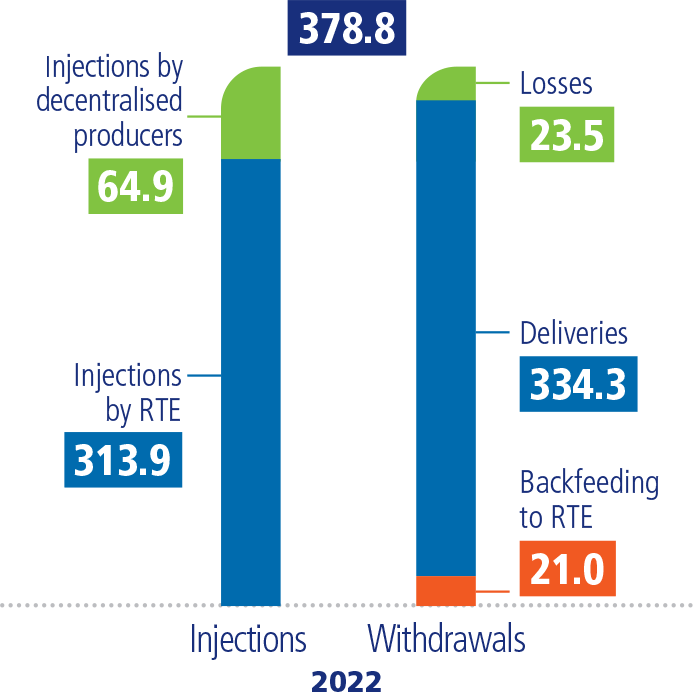38.1 millions
CUSTOMERS
38.1 millions
CUSTOMERS
1.4 million
KM Of NETWORK
4,415 M€
INVESTMENTS IN 2022
39,208
EMPLOYEES
386
CONCESSION AGREEMENTS
As a distribution network operator, Enedis’ main mission is to operate and develop the public electricity distribution network. Enedis guarantees the security and safety of the network, and oversees the balance of electricity flows at all times. Enedis now serves around 95% of the population in continental metropolitan France. The remaining 5% are served by Local Distribution Companies (LDCs).
In 2022, Enedis distributed electricity to more than 38.1 million customers (points of delivery). It enabled feed from more than 634,700 production sites in mainland France by means of a network of around 1.4 million kilometres.
At 31 December 2022, the distribution network for which Enedis is the concession holder was made up of around:
(in TWh)

This graph shows the simplified report of energy flows - 2022.
Injections
Injections by decentralised producers: 64.9
Injections by RTE: 313.9
Withdrawals
Losses: 23.5
Deliveries: 334.3
Backfeeding to RTE: 21.0
Electrical losses are inherent in the functioning of the distribution network. They primarily result from physical effects, which are directly dependent on the amount of electricity delivered. Enedis must compensate these losses to complete the amount of energy delivered to all the customers connected to the distribution network.
Energy purchases made to compensate losses recognised in the accounts, including restatements of prior fiscal years, amount to €2,223 million. To compensate these losses, Enedis buys the corresponding electricity from the wholesale market, either through organised market platforms, or through calls for tender that are open to around 20 qualified suppliers. Enedis also takes part in the consultations organised by the Purchase Obligation mission, within DOAAT.
Enedis’ access to ARENH rights to cover losses is implemented through specific calls for tender with a panel of qualified suppliers for this product. Enedis exercises its ARENH rights when the market prices are higher than the ARENH price.
Pursuant to the EU Directives, in order to comply with the rules on non- discriminatory access to networks and on management independence that are binding on network operators, said operators must be independent from any energy supply and production activity. If the distribution network operator is part of a vertically integrated company, it must be legally separate in order to guarantee its functional and decision-making independence.
In this regard, EDF and Gaz de France, now Engie, made their distribution network operators subsidiaries. ERDF was founded in 2008, and changed its name to Enedis on 1 June 2016. This new name will also raise the profile of the network operator and clarify its purpose, as the CRE recommended.
Enedis and GRDF share a “ordinary service” in accordance with the legal framework (see section 1.4.4.2.3 “Service shared by Enedis and GRDF”).
Enedis, pursuant to the conditions set by law and the concession contracts signed with each of the public electricity distribution contracting authorities, performs its missions as the public distribution network operator in mainland France. These missions are: